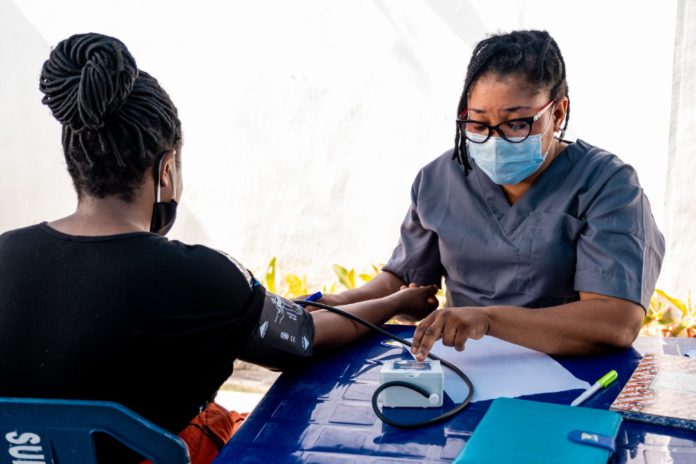A team of physicians has recommended the scale-up of the NCD CARE programme to more hospitals in Ghana to increase access to care for people living with hypertension and diabetes.
The recommendation was given by experienced physicians and specialists from the Greater Accra regional hospital, the University of Ghana Medical Centre (UGMC), and the 37 military hospitals.
All three hospitals have been caring for over 400 patients living with noncommunicable diseases in the Greater Accra region through the NCD CARE Mobile App.
The App which was created through a partnership with PharmAccess Foundation, Luscii Healthtech, and the UGMC currently complements Ghana’s NCD strategy in line with the national health policy.
With the NCD Care program, patients measure and input their Blood Pressure and blood sugar measurements/vitals in the mobile App, and their doctors receive automatic alerts which provide information on the patient’s health condition, enabling them to reach out via phone or messages as soon as risks are detected.
Speaking at a program review meeting held at the Rock City Hotel in Kwahu, the NCD program lead at the UGMC, Dr. Emmanuel Amoah explained that the key challenge in health care delivery that the NCD app helps to address is overcrowding.
“Patients don’t have to come to the hospital every time; just to get their Blood pressure and blood sugar readings analyzed; the App closes the gap between us and the patients,” he noted.
Dr. Amoah added that “before the NCD Care monitoring of patients with hypertension and diabetes was difficult, we used to give them BP profile sheets and hoped that they checked morning and evening. As at the time they leave and the next visit, we didn’t know what was happening.”
He is excited that he can now monitor the patient’s condition remotely and in near – real-time.
The user experience so far has been positive, with testimonies about the platform’s user-friendliness and the convenience it provides for patients.
Dr. Amoah further explained that the use of the App enables doctors to constantly monitor their patients remotely, rather than having to wait for one to three months before meeting the patients for a scheduled review.
This makes the App convenient for remote doctor-patient interactions to enhance timely interventions and avoid fatal complications.
Non-communicable diseases (NCDs) like hypertension, diabetes, and cancer are leading causes of death worldwide, representing an emerging global health threat.
The WHO has predicted that by 2030, NCDs are expected to become the leading cause of death in Africa.
In Ghana, Hypertension is a common cause of medical emergencies such as heart failure and kidney failure.
Program Scale Up with Self-Management Modules
Speaking to journalists at the sidelines of the meeting, the country Director for PharmAccess Foundation in Ghana, Dr. Maxwell Antwi noted that both Diabetes and hypertension are lifestyle diseases that can be managed well if patients would adopt healthy ways of living.
He said the pilot phase of the program implementation has offered the stakeholders the opportunity to practically conduct a critical assessment of the platform, review patients and doctors’ feedback, and recommend solutions to them.
Dr. Antwi explained that during the scale-up, stakeholders would explore creative ways of onboarding new patients, and build in more self-management videos and informative tools for patients.
“This mobile App will revolutionize NCD care in Ghana,” Dr Antwi said.
“We want to work hard to make the App versatile and more user-friendly, synchronize it with communication Apps like WhatsApp, and other messaging Apps on phones,” He added.
He further cautioned people to reduce their salt intake to avoid getting hypertension and diabetes. “A lot of Ghanaian local foods such as salted fish (Koobi, Kako, Momone,) are highly salted,” he warned.
According to Dr Antwi, the App would have educational information like stress management, foot care, exercise information, healthy heart diet recommendations, and tutorials to enhance the user experience during the scale-up phase.

